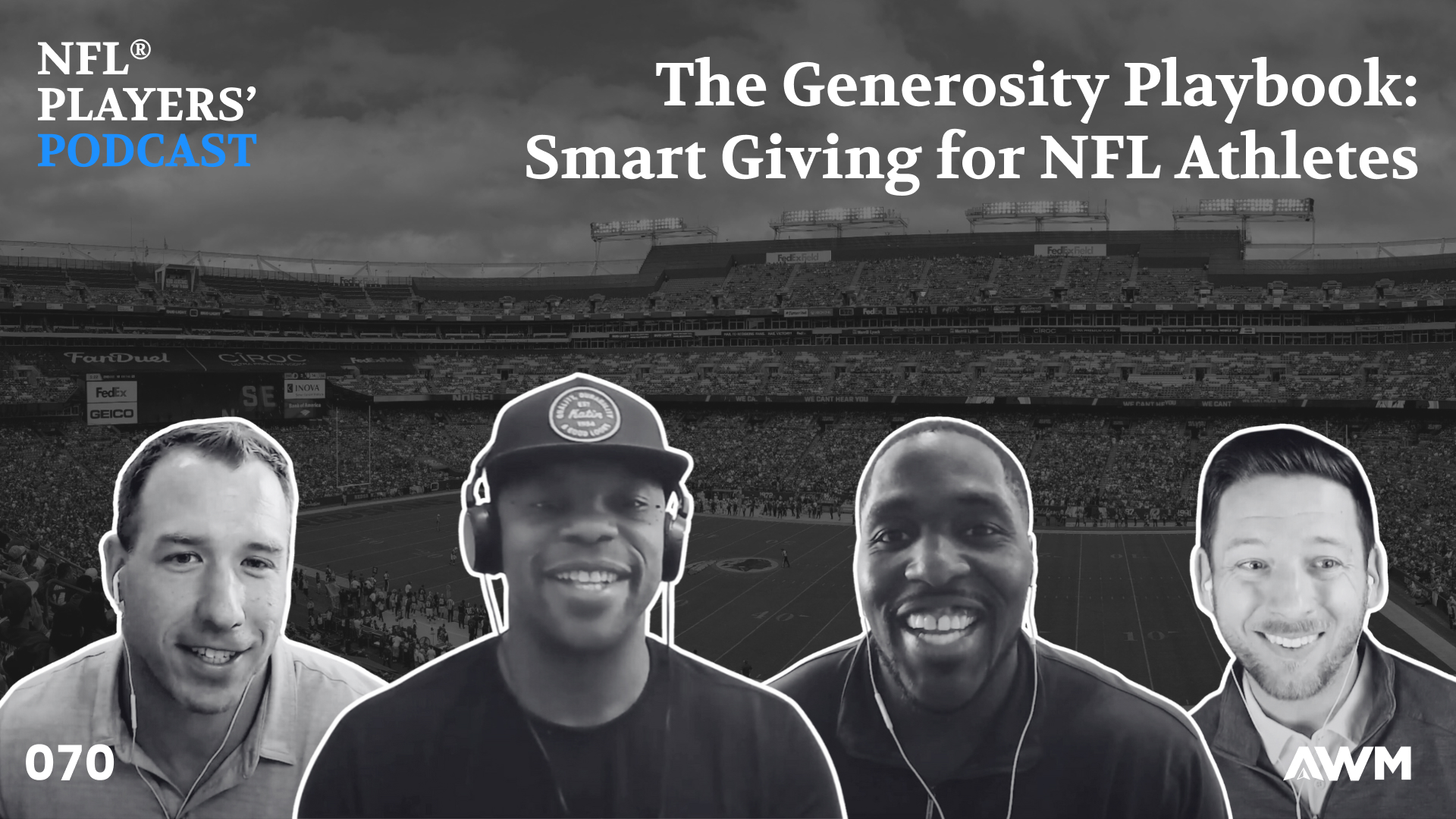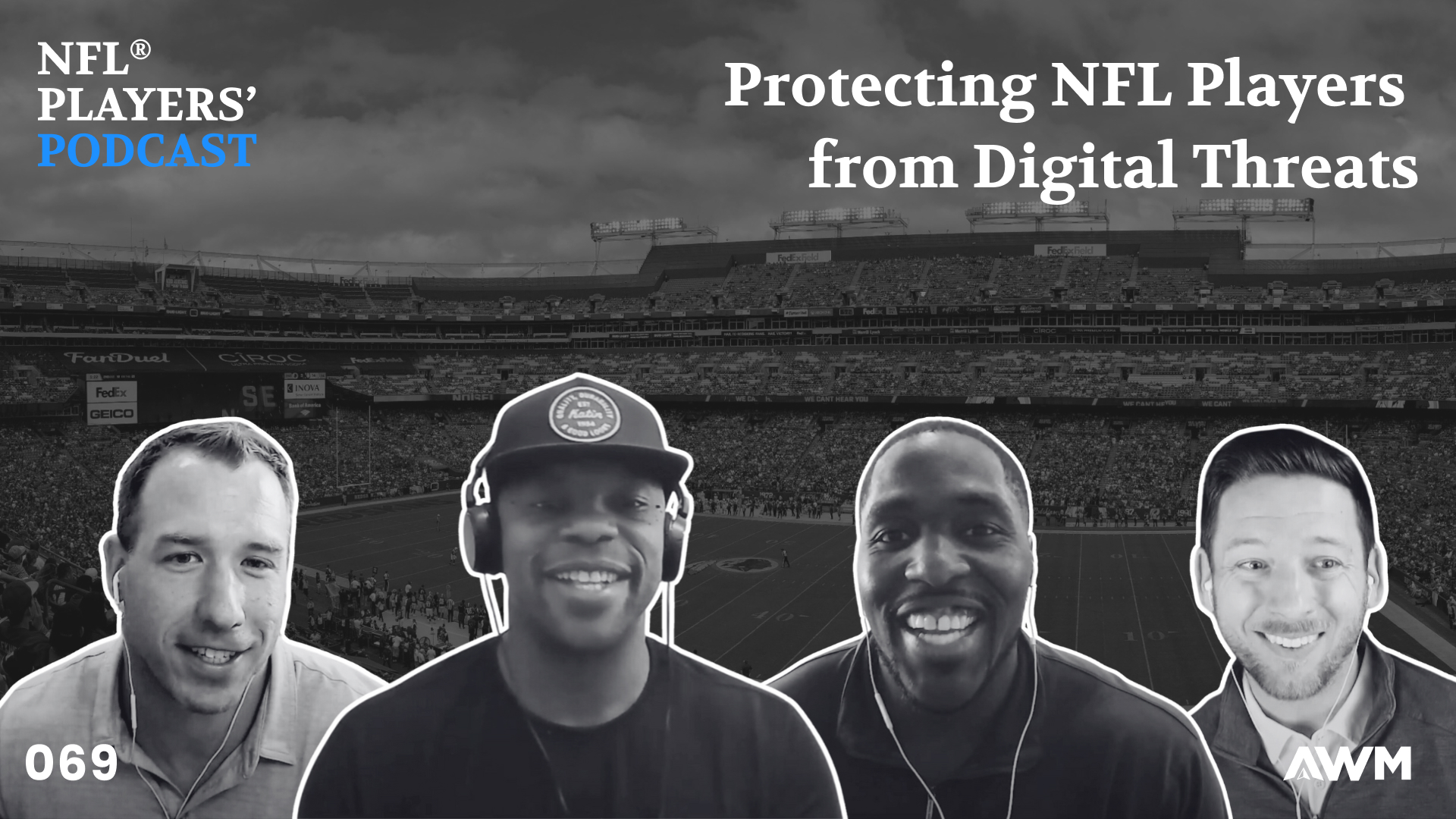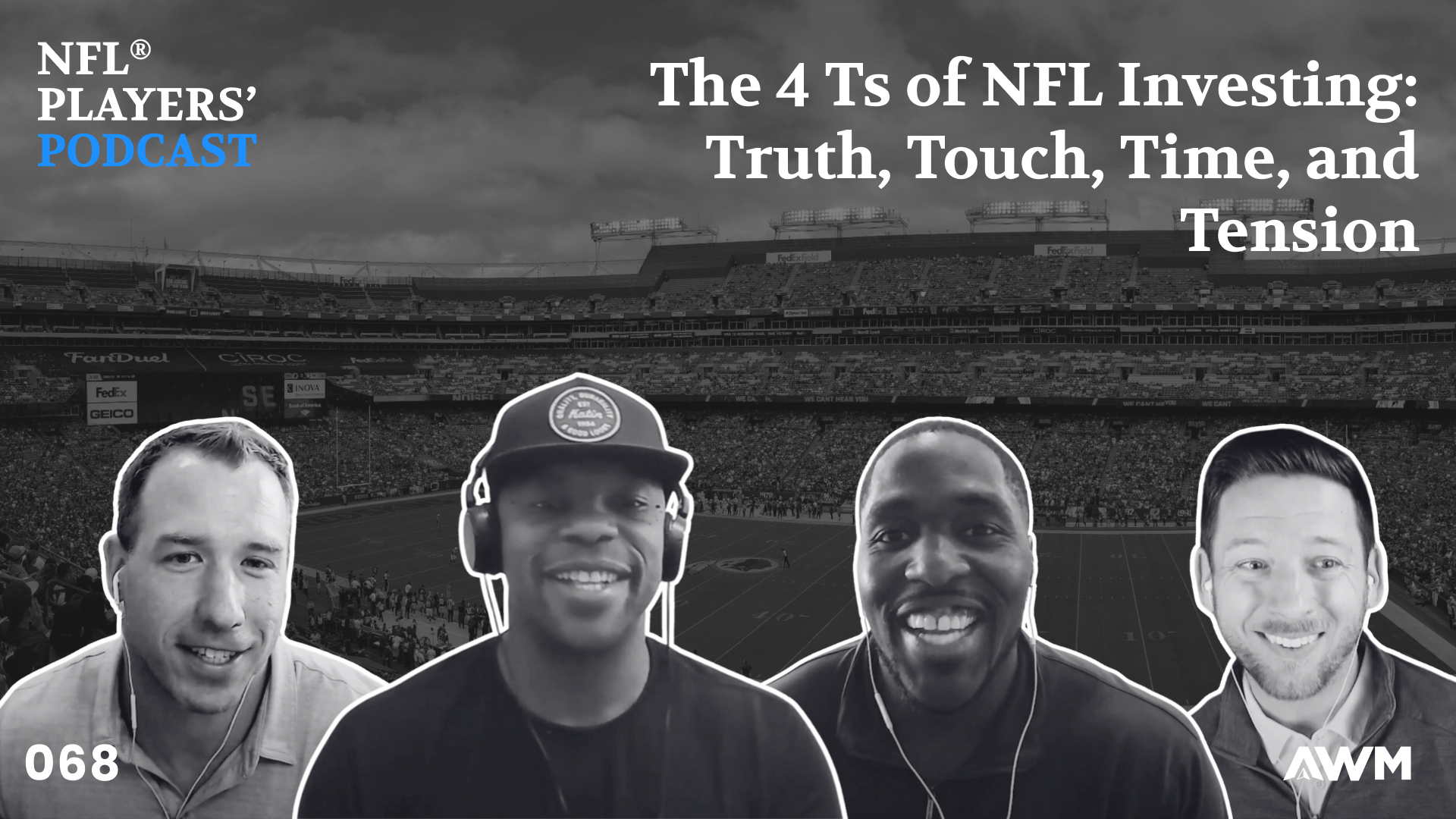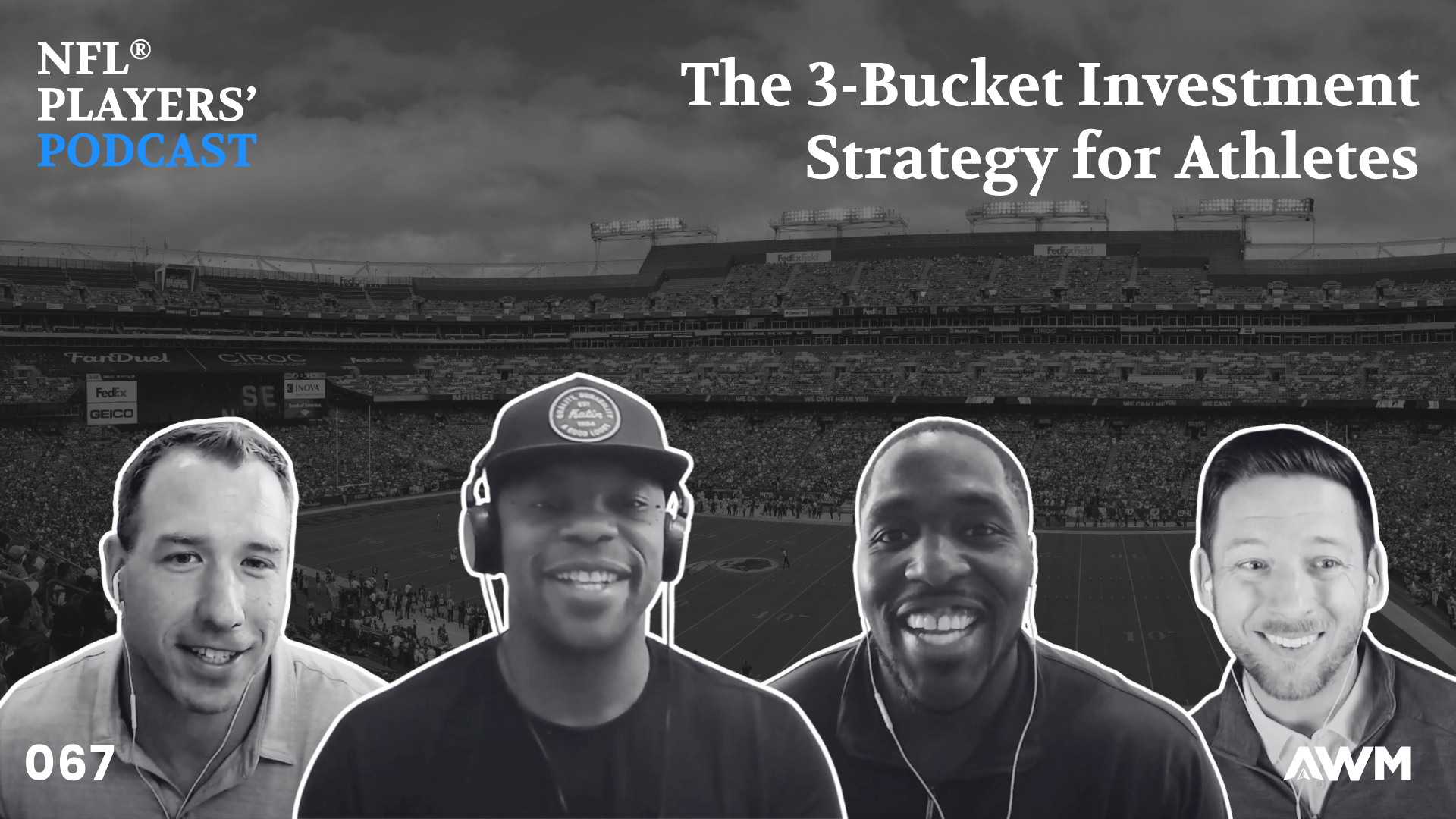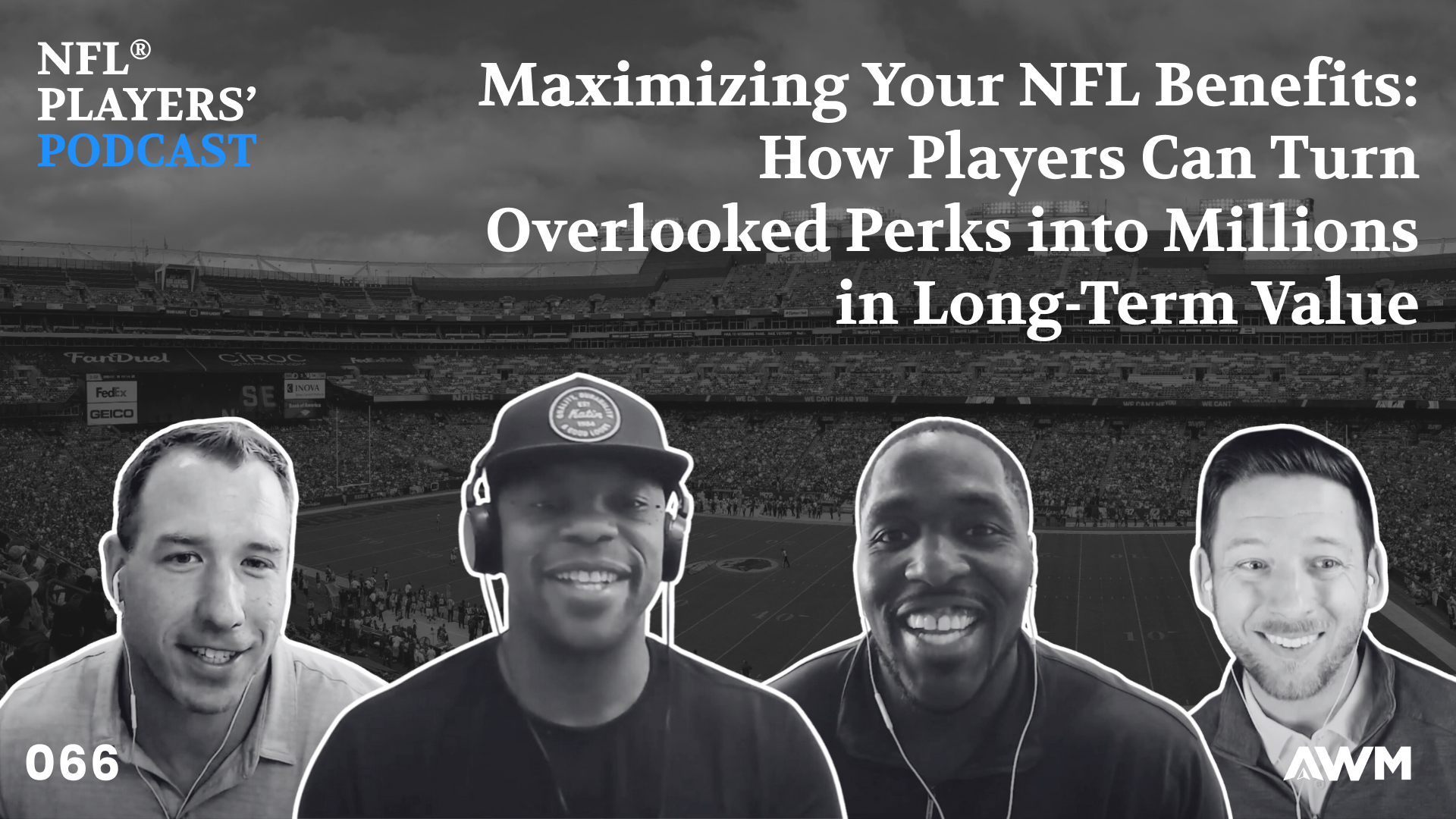Paying Your Future Self | NFL Players' Podcast #47

Join host Riccardo Stewart and co-hosts Zach Miller, Jeff Locke, and Sam Acho as they explore the concept of "paying your future self" in Episode 47 of the AWM NFL Podcast. The discussion navigates through personal and financial strategies for NFL athletes, emphasizing the importance of planning early to ensure long-term prosperity. This episode offers invaluable insights into achieving enduring financial stability and lays the groundwork for securing a flourishing legacy for athletes and their families.

Key Highlights:
- Sam Acho highlights the significance of investing in both physical well-being and finances for future benefit.
- Jeff Locke emphasizes the importance of early savings and the advantages NFL players have in securing long-term financial stability.
- Zach Miller discusses lifestyle management and the necessity of maintaining adequate savings to counter lifestyle creep.
- Strategies on building intellectual and social capital during and after an NFL career are shared by Sam Acho.
- Practical financial strategies such as maintaining a 40% savings rate are presented by the hosts.
Quotes:
- "Saving money is paying your future self." – Sam Acho
- "Your ability to control time is real wealth." – Zach Miller
- "Starting early is the biggest superpower you have as a young athlete." – Jeff Locke
Transcript
Hey, I want to welcome you guys back to another episode of the AWM NFL podcast. My name is Ricardo Stewart. I get the opportunity to be your host and I'm joined with my friends, Zach Miller, Jeff Locke and Sam Ocho. Fellas, um, good to be back on the podcast with you guys. And so one, just real quick, check in.
How are you guys doing?
guys a
I'm doing great, man. I know y'all just came back from the senior bowl. I was here at the East West Shrine game throughout the week connecting with some of the guys, which was awesome and been, uh, seeing some of the guys train. And so it was great, uh, to be here at the East West Shrine bowl, seeing some of the collegiate athletes getting ready for the next level.
And even currently some of the guys training for the next level. So it's been awesome for me. But Zach, what about you, man? How was this? I was here. There was some senior bowl conversation earlier. About the long days y'all had, how, how has it been for y'all?
Senior Bowl was great. Uh, my third time going and, uh, you know, we had a fan actually approach us from the from the podcast. So, um, you know, we're, we have listeners out there.
They're out there and I, I had, uh, I had second wedding anniversary this weekend, guys, so I'm a little behind, a little behind you guys on, uh, on getting up there, being married, but, um, I didn't forget and I planned something. So like, big, big win for me. It's
That's legit. That's legit, man. Congratulations. Well, you know, on that note, nothing even related, but we can somehow make it related. What I want to talk about today on the podcast is paying your future self. You know, that's a phrase that we use a lot when it comes to our clients of going, making sure that you're paying your future self.
Uh, this past weekend, I got a chance to be with my entire family and we were celebrating the life of my. And it was good to hear her, her kids, you know, my mom and her sisters and brothers and us as the grandkids. And then our kids as great grandkids really talk about like with a legacy that she left and someone, someone says something, it's not so much legacy about what you leave for someone, but actually what you leave in someone.
And I thought it was pretty interesting as we talked about just something she planted and how we're receiving the fruit. And I think that that happens from an investment of our parents and grandparents into us. But there is a sense of going at some point in our life, we invest in ourselves and we begin to see those benefits in the future.
All right. You do it in school where, you know, the beginning of ninth grade, you write a letter to yourself and then they have you open it your senior year. And you begin to see, okay, that all of these things happened that I put in all of these things that I wanted. And I think it's the same thing when it comes to NFL athletes, particularly who have a career of playing football for X amount of years.
And when they're retired, they're relatively young in terms of standards of most financial advice, and it's going, how well did they do paying their future selves and the time in which they were getting the most amount of money. And so that's, that's what I want to be able to look at today. And first, Sam, I'm going to start with you.
Just
meaning of what it means to pay your future self. But before that, I want to talk about. A physical meaning a practical meaning of how I paid my future self when I was playing in the NFL is about year six or maybe year seven.
And I was obviously playing and trying to get a new contract and all those things, but also I was banged up, had a couple injuries. I had actually had broken my leg a few years prior and the residual effects were. Uh, I felt them right. Even walking up and down steps. That's nodding his head because he gets it right.
Walking up and down steps were pain. Even trying to play through the pain in my knee was just, it was very laborious, was hard. And so what I decided to do from a physical perspective, like I said, we're going to get into the financial, but physically I said, you know what? And then we had, we had kids at the time, my wife and I, I said, I want to be able to play with my kids when I get older and not be like limping around.
Like my son, who was probably one or two at the time. The way he walked up steps was by using the side rail, because that was the way that I had walked up steps, because I could barely walk. I mean, it was, it was football, the whole deal. And so what I decided to do from a physical perspective to pay my future self physically.
Was I would start instead of just doing rehab for football injuries, I would do prehab, I would start working on ways to strengthen my leg or my knee or my quad or, or my ankle or what calf all these things. So that when I became older when I retired from football, I'd be able to run around with my not just kid now it's kids and play and and be able to enjoy life outside of the game.
And so I know we may have been looking for like a financial perspective, which we're going to get into, but I just wanted to really remind guys of the physical perspective of paying your future self. I was 26, 27, I don't know, maybe 29 years old at the time. Now I'm 36 years old and now I'm running around with my four kids and I'm jumping up and down and chasing them in the street and things like that.
And so that's one physical way to pay your future self.
No, I think that's helpful. And to think that your son was only walking up the steps using the rail, just because he watched you is kind of funny because I think you said he was one at the time, just so you know, most one year olds are not just sprinting upstairs yet, but maybe the auto kids, the high expectations in that house.
So, so Jeff, um, just the average age of a financial advisor in itself is usually older than definitely those of us on the screen. And then the age of most clients, I was looking online at somewhere between the range of 55 and 65. Um, when most of our clients make the bulk of their money between 22 and 30.
And so just, just how does that work when it comes to paying your future self, when it comes to advice for NFL players?
Yeah, and paying your future self on the financial side is very simple. It's what do you save and invest for future you, the guy you don't even know. One of the coolest things, go Google this when you got time, is like, there's these image generators you can do online where you can put a picture of yourself and it'll calculate what you look like at age 60.
And it's like a different person, right? So that's the person you're saving for. But, when you're 55 or 60, You're too late in the game to be saving and investing and paying yourself forward. You got to hope that the younger version of yourself actually did something right. And most people that don't have the opportunity we have right to play in the NFL, save so much money early on.
They wait till like age 40, 45, 50 to be able to save anything because they're just spending all their money trying to just support their family and get by. Whereas we have the opportunity at age 20, 25, 30 to be putting away so much of our money for our future selves that we have to actually pay less in terms of how much we have to save and invest than people later on that have to pay.
Two, three, four, five times as much as we paid earlier just to catch up and be able to support themselves when they retire or support the next generation of their family.
Yeah, I think similarly, Zach, I had this next question just teed up for you. And that's, you know, as somebody who did pay your future self, um, and played, you know, eight years in the NFL, just kind of piggybacking on what Jeff is saying is like, what is the differences when it comes to providing, you know, holistic advice?
For someone who's retiring at 30, as opposed to someone who's retiring at 60 or 65,
Spending. That that
The biggest thing is you have to save a lot more when you have that much kind of spending, you can't just go by guidelines. That's why financial advisors that work with just the general population, they fail athletes. And that's why you see the numbers of guys running out of money. It's because they don't realize that you're going to make the most amount of income, like you said, between 22 and 30.
And so you have to save. At least 40 percent of that put it to work in investments that that money grows that money sustains That kind of spending you're going to learn to have in the nfl No one makes it through a long career in the nfl without what you know Advisors call lifestyle creep or it's easier.
You know, it's easy to spend money. It's easy to buy Nice things, buy nice houses, nice cars. So all of those things, if you want to do that for the short time you're a player and then have to lifestyle adjust as the term or spend way less money when we're done as a player. Yeah, you can do that. You can have a great time in those eight, 10 years as an NFL player, but you'll be out of money when you're done and you'll have a forced adjustment, which is going to be rough.
It's always easier to go forward forward than backward, like Ricardo always says. And so if you If you control that kind of spending when you're a player, it allows you to spend more money throughout your lifetime. And so I was able to do that. I hit savings rate and really good savings rate as a player and invested that money.
So by the time I was done playing, I now can support. An incredible amount of spending because my assets are supporting that spending. I don't have to rely on the NFL. I don't have to rely on some owner in the NFL controlling, you know, what I do with my time. I get to control what I do with my time. And that's how, you know, that's, that's real wealth.
And you have that ability as an NFL player, if you do it the right way.
Sam, I mean, obviously we have our clients in whom we work with, but you also talk to many other NFL athletes, those who are playing, those who are retired. In what ways can you give us examples, maybe one or two that you've seen NFL players do this? Well,
Yeah. Well, I think there's two examples. Um, and just to hit on the financial piece, you heard it from Jeff, heard it from Zach about that hitting that 40 percent savings rate. It's of the utmost importance, right? Okay. I got this money. I want to go spend it. No, no, no. Before you spend it, pay yourself first, right?
Saving money, all that it is, it's paying your future self. And so, okay, I get it. You're going to pay taxes, right? 40 to 50%. Okay. You want to spend, you want to buy? Yes. Go spend, buy. Right. But also think about that 40 percent that you want to save. That's not just for some random person, that's for you and your children and your children's children.
And so that's just one example right from a general perspective for clarity, but I think just going back to the piece of athletes that have done it really well. It's been the athletes that have really invested in their, in their social capital, but also their, like their intellectual capital as well. And we talk about these topics all the time, but I've seen guys been around guys.
I've been one of the guys that I realized, okay, I'm not going to just solely. Yes, focus on football, but like I'm more than a football player. So how do I invest? Intellectually, how do I invest in different spaces when it comes to maybe it's venture capital. Maybe it, maybe it's in the tech industry. Maybe it's in TV and in speaking, maybe it's in the business world.
How do I actually build relationships and leverage who I am while I'm playing so that when I'm done playing, those relationships are still sustained, even though I'm not a current player. I mean, Zach Miller is a great example, right? While he was playing and when he was finishing up, he was going back and said, okay, I'm going to go and get my education.
I'm going to go on. Yeah. Uh, become a certified financial planner. Jeff locks. Another example of, okay, while I'm a current player, I'm going to teach all my teammates. I'm going to give them for lack of better terms. I don't want to say financial advice, but put them on game. While I'm a current athlete, I don't play with guys like Larry Fitzgerald, Matt Forte, you name them.
These guys were investing in the community. They were building relationships within the communities in which they live, work, and play, not just in football, go to the baseball world as well. And so I, from a, from a general perspective, it's using what you have, um, not just while you play, but also using it and thinking of when you're done playing, how important your physical, yes, physical capital.
But also your intellectual and your social capital, those things are as well.
professor, I want you to wrap up, wrap, wrap it up for us, provide some wisdom, give our, give our clients, give our audience, give NFL athletes. It'd be one thing to think about and then two things to do.
So one thing to think about is let's just apply some numbers to it. I want these numbers to stick in your head. Okay, so say you're 20. You put away 100k and you invest it for 40 years. This is for future self, your 60 year old self. Say you're in 7 percent or you can do that over 40 years. Not guaranteed, but you can probably do it, right?
That 100k turns into 1. 5 million. Right. 15 times what you put in over 40 years, but say like, nah, I'm not going to do it. I'm just gonna wait till I'm done playing. I'm going to spend my money. You know, it's cool. Like my 40 year old self will figure it out. My retirement and stuff like that. Okay. You put a hundred K in at 40, you only have 20 years for it to grow.
That 100K only turns into 400K, right? 400K versus 1. 5 million, right? If you wait 20 years and say, nah, I'll just handle that later on. That's compounding. That's why starting early is like the biggest superpower you have as a young athlete, right? So that's sticking your head. Two quick things for you to do, right?
We've talked about already. Go and calculate your 40%. You know how much you're making in NIL? You know how much you're making on the field this year? What's your 40%? What am I going to save? And can I live off of 20? Go calculate your 20%. Can I live off of it or am I burning way more than that 20 percent right now?
Last little thing. See if you got a Roth IRA. See if you got an individual 401k. Those are just two account types. So when you're putting away that 40%, you're paying the least in taxes over your life while you're investing for your future self.
So I want you to put yourself in the shoes of like we talked about earlier, celebrating my grandma's life. The 40 years from now that you can sit back and you can think however old you are. Now, 40 years ago, you can thank yourself because you're sitting with your kids and particularly your kids, kids, and they're sitting in a place that's far better than you can even imagine.
And so if you have any questions on how do I do this, I need to be pointed in the right direction. Please reach out to us. Our number is 602 989 5022.
Share this post
Related articles
Your Family Office

We're here to help you navigate.
Our advisors are ready to serve as your Athlete Family Office.
Your Family Office

We're here to help you navigate.
Our advisors are ready to serve as your Athlete Family Office.





